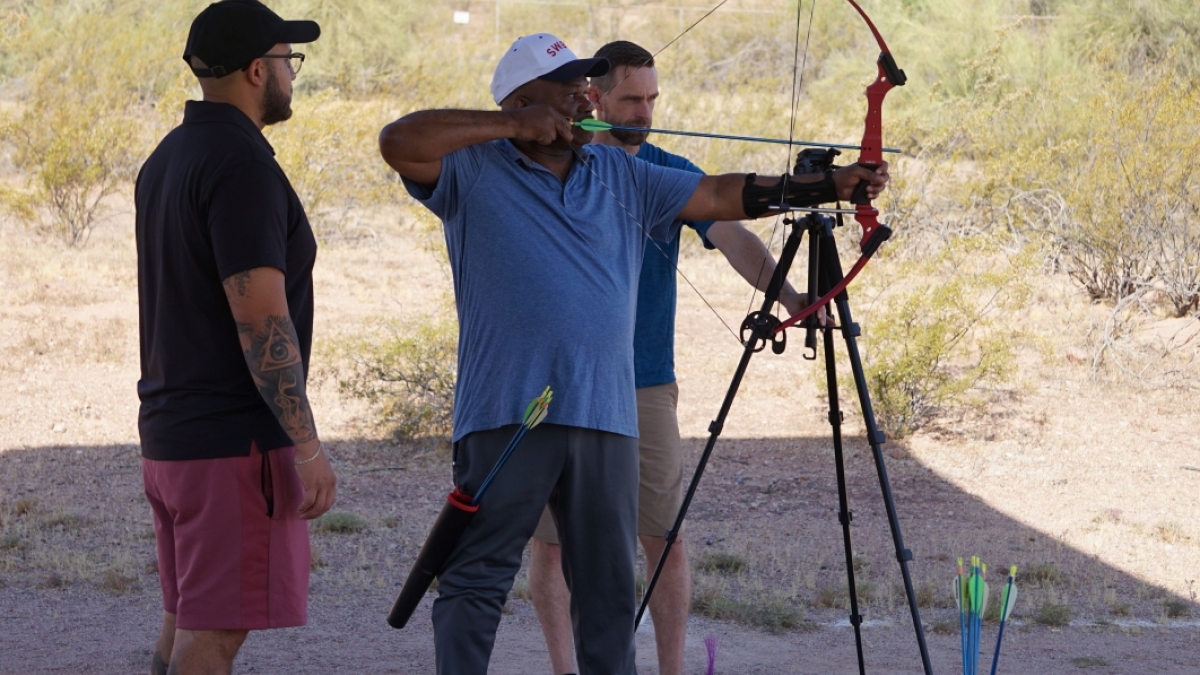Recreational therapists from ASU, VA help veteran experiencing blindness learn archery

Veteran James Malone, an archer who is experiencing blindness, shoots an arrow at the Papago Park Archery Range in Phoenix with the help of his therapists, ASU alum Rick Alvarado (left) and the VA's Joshua Parks. Photo by Mark J. Scarp/ASU Watts College
As he stood on the Papago Park Archery Range, James Malone planted his feet as he faced a target about 10 meters away.
He stretched out his arms, felt an imaginary bow in his hands and concentrated. With one hand he accepted an actual bow from the man standing next to him, and reached with the other to pull an arrow out of his quiver.
Malone raised his arms to where they were a few moments before, drew the bowstring back to his lips for a second or two, then took his shot. Thwap. He heard the sound of the arrow striking the target.
“It’s in the blue,” said Josh Parks, an adaptive sports coordinator with the Phoenix VA Medical Center.
Malone smiled and nodded as he reached for another arrow.
Parks has worked with Malone, who is blind, for several months, accompanied by Rick Alvarado, a recent Arizona State University graduate who interned at the VA Medical Center this spring.
Alvarado holds a bachelor’s degree in parks and recreation management from the School of Community Resources and Development, part of the Watts College of Public Service and Community Solutions, with a focus in therapeutic recreation.
A diabetic in his 70s, Malone remembered how he slowly lost his sight in 2015 due to complications from glaucoma.
“You are driving, and you don’t have vision on your right side, you make a right turn and you’re up on the curb,” he said.
The former Navy operations specialist’s wife, Tara, does the driving now. Malone said archery is one way he keeps active, since he no longer can participate in his former pastimes of basketball and table tennis.
Malone said he found out about adaptive sports from fellow vets he would meet at a restaurant every Veterans Day.
“One of them suggested I try it, which he called ‘things you want to do that you can’t do any more,’” he said.
Before his therapy, Malone’s last experience on an archery range was in junior high school.
Alvarado’s internship with the VA included leading an adaptive Crossfit group and assisting Parks helping veterans learn and enjoy archery, cycling and bocce ball.
He said working with Malone was a great learning experience.
“The first time we came out, once he hit the target, his face lit up,” said Alvarado, who is about to start working as a recreational therapist at the Phoenix VA.
“The goal of recreational therapy is to improve veterans’ quality of life and assist them in achieving their goals,” he said. “James was always excited and ready to go, and he expressed how much archery would help. It was very rewarding working with James, and I’m glad I was a part of his journey.”
Malone uses his knowledge of distance from when he could see to focus his mind on the target. On the recent morning he was shooting at the range, his arrows struck it more often than not.
He can recognize a miss with his hearing, too. The “thwap” is replaced by the sound an arrow makes after falling to the dirt.
Malone often uses a blindfold when shooting arrows. While an observer might find that odd, Parks said that Malone’s tiny amount of remaining sight — his eyes still try to focus as if he could still see normally — can distract him from concentrating his mind on the target.
From January to April, Malone came to the range once a week. Parks said that as a veteran himself, he draws special satisfaction from working with veterans like him.
“It’s from helping these vets, finding a quality of life after the military,” Parks said.
Malone said he’s ready to take up his next sports experience: rock climbing. He offered some advice to fellow veterans.
“Don’t be sitting around the house,” he said. “Do adaptive sports.”
More Health and medicine

The science of sibling dynamics: Why we fight, how we relate and why it matters
We have Mother’s Day, Father’s Day and even Grandparents’ Day. But siblings? Usually they get a hand-me-down sweatshirt and, with any luck, a lifetime of inside jokes.But actually, there is a…

New study seeks to combat national kidney shortage, improve availability for organ transplants
Chronic kidney disease affects one in seven adults in the United States. For two in 1,000 Americans, this disease will advance to kidney failure.End-stage renal failure has two primary…

New initiative aims to make nursing degrees more accessible
Isabella Koklys is graduating in December, so she won’t be one of the students using the Edson College of Nursing and Health Innovation's mobile simulation unit that was launched Wednesday at Arizona…



